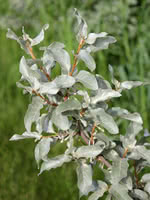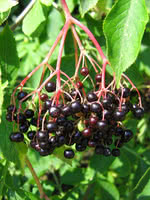Mon-Fri 9am - 5pm Mountain time
Silverberry (Wolf Willow) vs Black Elderberry
Elaeagnus commutata
Sambucus canadensis
NOT AVAILABLE THIS SEASON - MIGHT RETURN
Silverberry (also known as Wolf Willow) is a common native North American shrub. This beautiful ornamental plant has characteristic silver leaves and fragrant yellow flowers.
Its silver berries remain on the branches through the winter. Silverberry is cold hardy and has some ability as a nitrogen fixer. It can grow on dry to moist sandy/gravel soils. This plant is very low maintenance.
Black Elderberry is a deciduous shrub native to eastern North America. You can plant this shrub in moist areas and it will help stabilize your soil. You can also use it on rural properties anywhere you'd use a lilac.
Black Elderberries are considered to be partially self-pollinating. So while they will still produce some berries without cross-pollination, planting with another variety will increase yields. Consider planting with Ranch Elderberry or Bob Gordon Elderberry.
Warning: the seeds, stems, leaves, roots, and uncooked berries of the Black Elderberry are poisonous to humans when eaten in quantity. You should cook the berries to make them safe for human consumption.
Silverberry (Wolf Willow) Quick Facts
Black Elderberry Quick Facts
Toxicity: leaves, stems, and uncooked berries are poisonous to humans

